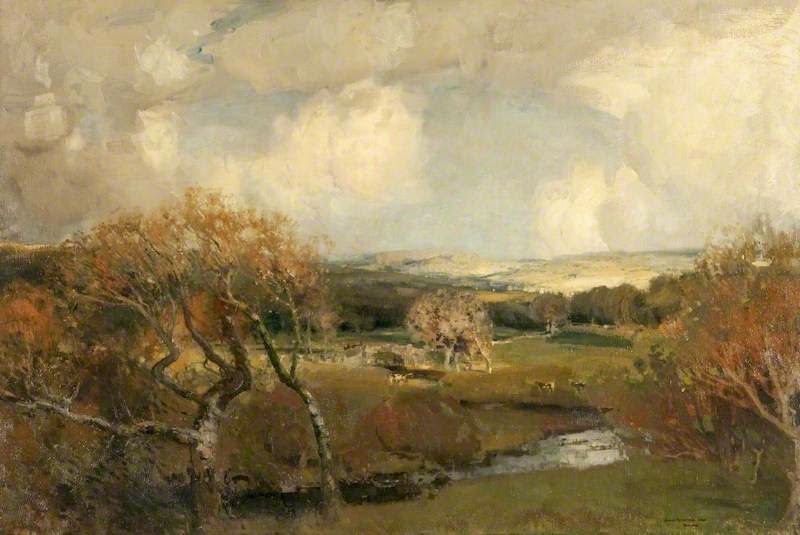The trees are now half-empty. The leaves that remain are a brilliant deep-red. A wistful sight, of course. But this week, grieving over the departed and departing leaves, I received an unexpected gift. As I walked beneath the maples, I noticed the shapes of dozens of leaves on the sidewalk: the remnants, in rusty-brown pigment, of leaves that have vanished in the wind, but which once covered the sidewalk in the rain.
These revenants seemed to lay the whole of the season before me in an arc, from the sun-struck red and green boughs of late August to the dark, bare branches and the fluttering red stragglers of October. And ghost leaves on the ground beneath my feet.
Song at the Beginning of Autumn
Now watch this autumn that arrives
In smells. All looks like summer still;
Colours are quite unchanged, the air
On green and white serenely thrives.
Heavy the trees with growth and full
The fields. Flowers flourish everywhere.
Proust who collected time within
A child's cake would understand
The ambiguity of this --
Summer still raging while a thin
Column of smoke stirs from the land
Proving that autumn gropes for us.
But every season is a kind
Of rich nostalgia. We give names --
Autumn and summer, winter, spring --
As though to unfasten from the mind
Our moods and give them outward forms.
We want the certain, solid thing.
But I am carried back against
My will into a childhood where
Autumn is bonfires, marbles, smoke;
I lean against my window fenced
From evocations in the air.
When I said autumn, autumn broke.
Elizabeth Jennings, A Way of Looking (1955).
Edward Waite (1854-1924), "The Autumn Road (Mitcham Woods, Surrey)"
The following poem registers a high reading on the Autumn Wistfulness Quotient. Although it has appeared here before, it is a poem that deserves repeated visits.
Leaves
The prisoners of infinite choice
Have built their house
In a field below the wood
And are at peace.
It is autumn, and dead leaves
On their way to the river
Scratch like birds at the windows
Or tick on the road.
Somewhere there is an afterlife
Of dead leaves,
A stadium filled with an infinite
Rustling and sighing.
Somewhere in the heaven
Of lost futures
The lives we might have led
Have found their own fulfilment.
Derek Mahon, The Snow Party (Oxford University Press 1975).
The combination of lovely, exact particulars and evocative, ever-expanding images is marvelous. On the one hand: "dead leaves/On their way to the river/Scratch like birds at the windows/Or tick on the road." Exactly. On the other hand: "the prisoners of infinite choice," "an afterlife/Of dead leaves,/A stadium filled with an infinite/Rustling and sighing," and "the heaven/Of lost futures." Wonderful.
Edward Waite, "Autumn Colouring" (1894)
Finally, a poem for the end of the arc.
Autumn Ends
Lost in vacant wonder at how the months flow away in silence,
I sit alone in my idle hut, thinking endless thoughts.
An old man's cares, like these leaves, are hard to sweep away.
To the sound of their rustling I see autumn off once again.
Tate (pronounced ta-tay) Ryuwan (1762-1844) (translated by Burton Watson), in Burton Watson, The Poetry of Ishikawa Jozan and Other Edo-Period Poets (North Point Press 1990).
The traditional Chinese and Japanese poets tend to be fairly stoic, but this stoicism is combined with an absolute commitment to stating things exactly as they are. Thus, we should not read any note of complaint or self-pity into Tate Ryuwan's poem (which is in the form of a kanshi, a poem written in Chinese by a Japanese poet, adhering to the strict rules of traditional Chinese prosody). He is simply reporting how things are with him and with the World at the end of autumn. The poem exhibits that distinctive quality of the best Chinese and Japanese poetry: the leaves are not "symbols," nor are they a "metaphor" or an "allegory," yet the human world and the natural world become one and the same. Or so it seems to me.
Edward Waite, "The Mellow Year Is Hastening to its Close" (1896)































